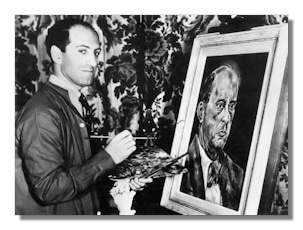At last, LA wakes up to Schoenberg
OrchestrasArnold Schoenberg found refuge in 1930s Los Angeles, but little else. The Philharmonic has persistently ignored the great modernist, making a rare exception for Verklärte Nacht but bypassing his major works.
Now, in the 150th anniversary of Schoenberg’s birth, the LA Phil has tipped its hat in two concerts in its 2024-25 season, rolled out today:
Schoenberg at 150
Arnold Schoenberg’s inventive approach to harmony left a lasting influence on the 20th century. Marking the 150th anniversary of his birth, the LA Phil explores the work of the Austrian-turned-Angeleno composer throughout the season highlighted by two performances of Schoenberg’s Gurrelieder conducted by LA Phil Conductor Emeritus Zubin Mehta featuring soprano Christin Goerke (Tove), mezzo Violeta Urmana (Waldtaube), tenors Brandon Jovanovich (Waldemar) and Gerhard Siegel (Klaus-Narr), and speaker Dietrich Henschel (December 13 and 15).
The celebration continues with Schoenberg’s arrangement of Brahms’ Piano Quartet, part of the Ravel & Brahms series (February 13-16) that also includes Bacewicz’s Concerto for String Orchestra and Ravel’s Piano Concerto in G Major, and a chamber music program (December 3). The LA Phil is additionally working with the Arnold Schoenberg Center and the Schoenberg family to produce a temporary exhibit in BP Hall and print piece exploring the composer’s life in Los Angeles.
Other season highlights include:
Gustavo Dudamel leads 11 performances in Mahler Grooves Festival, including first performances of Symphony No. 7 with the LA Phil, Des Knaben Wunderhorn and Alma Mahler’s Five Songs; Festival also includes day-long Mahler-thon with YOLA and Colburn School musicians and listening parties in historic L.A. spaces
Seoul Festival, curated by Unsuk Chin, highlights modern Korean performers, composers, and culture
The John Williams Spotlight two-year retrospective continues, including Star Wars in Concert featuring music and film clips from the nine Star Wars saga films plus concerts with Gustavo Dudamel, Yo-Yo Ma and John Williams
Renowned Baroque conductor Emmanuelle Haïm begins her 3-year tenure as Artist-Collaborator with The Handel Project, featuring the LA Phil and Le Concert d’Astrée
Pan-American Music Initiative includes new Gabriela Ortiz commission, Día de los Muertos concerts, a John Williams Spotlight program featuring From Mexico to Hollywood: Golden Age Cinema, and LA Phil tour to Bogota, Colombia and New York’s Carnegie Hall
World Premiere of Carlos Simon’s Gospel Mass conducted by Gustavo Dudamel and with visuals by creative director Melina Matsoukas, a reinterpretation of a traditional Catholic Mass and an homage to the resilience and joy of the Black community
LA Phil joins Southern California’s landmark art event, Getty’s PST ART: Art & Science Collide initiative, with its day-long Noon to Midnight new music festival curated by Ellen Reid, featuring the world premiere of Doug Aitken’s Lightscape with the Los Angeles Master Chorale
pictured: Gershwin paints Schoenberg






Comments